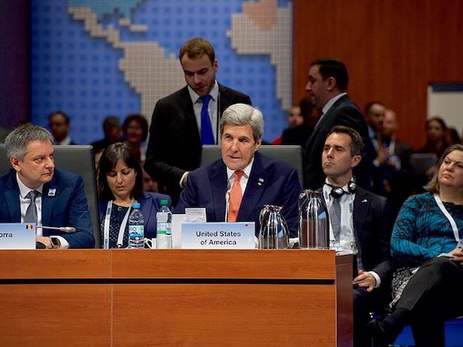Washington’s exiguous role in the Caucasus and Europe – Foreign Policy News

By Peter Tase
Who would have thought that Coca-Cola’s expulsion from Bolivia in 2012 would be the beginning of a historical demise of U.S. Foreign Policy influence not only in South America but also in Southern Caucasus and South East European regions as Washington’s staggering absence in the Nagorno-Karabakh Conflict, Syrian War, Crimean – Ukrainian crisis and its diplomatic incident with the Philippine President Rodrigo Duterte, last October.
President Obama’s ‘red line’ statement on Bashar Al Assad’s use of chemical weapons against his own people, and his withdrawal from such a public commitment, has encouraged the largest crisis since the wars of former Yugoslavia. Although the White House has supported Ukraine’s membership in the Eastern Partnership, an initiative led by Poland and Sweden, it is ignoring the fact that in 2014, Russia and P. R. China became the largest trade partners of Kiev, with almost US$13 billion in exports and US$ 19 billion in imports, a trade cooperation that contributes towards strengthening other sectors in the country and region. Meanwhile Italy is the sole and top export destination (US$2.66B) and Germany and Poland (US$9.03B, cumulative) are the top importers of Ukrainian goods.
On the other hand United States Secretary of State John Kerry created a diplomatic swirl by pretending that the leaders of Armenia and Azerbaijan “aren’t ready” to bring the Nagorno-Karabakh armed conflict to a lasting solution. Indeed Secretary Kerry has undertaken multiple trips to the world’s peripheral capitals to negotiate: the settlement of over two thousand members of Iranian mujahidin opposition group in Tirana – a capital city that is run by a prime minister who runs the largest drug cartels of Europe – visited the African continent four times and has never been able to squeeze a meeting with Azerbaijani President Ilham Aliyev on his busy agenda. Interestingly enough, in May 21-22, 2016, as his airplane was refueling in Baku, Secretary Kerry had lost a rare opportunity to become familiar with the Nagorno-Karabakh and the atrocities committed by Armenian Armed Forces in Azerbaijani soil, by spending an additional time to meet with his counterpart Minister of Foreign Affairs Elmar Mammadyarov and President of Azerbaijan.
Even though Secretary Kerry’s comments were made on the context of international negotiations that took place on Iran’s nuclear program, there was no legitimate reason on his part to argue that Azerbaijan is not ready to bring a solution to the Armed Conflict upon its soil that has been instigated by Armenian Armed Forces for over two decades. Azerbaijani authorities have undertaken repeated official visits to Washington; meanwhile the US Chief Diplomat has been too busy to conduct an official visit in Baku and demonstrate, at least, his readiness to solve the Nagorno-Karabakh Armed Conflict. Such a visit would have enabled Secretary Kerry to experience that tensions are indeed there, it is not fair to state that ‘tensions aren’t there.’ The US Department of State has created an unexpected vacuum in the Caucasus region, Ukraine, South East Europe and South America. Such an attitude has rightfully prompted Russian and Iranian leadership in the global stage, not only in the Caucasus region but also in the Balkans and various countries in Latin America including Venezuela, Ecuador and Nicaragua. The situation of Nagorno-Karabakh must garner a special priority in the landscape of US Foreign Policy Interests, under the administration of President Donald Trump, for two reasons: Azerbaijan is an important U. S. and European Union trade partner, Baku is a reliable actor in the former Silk Road region with an admirable financial stability and economic growth; despite its national territory being occupied by Armenian Armed Forces, Azerbaijani government has made possible the development of a sophisticated energy sector that has enabled the country to eradicate extreme poverty (despite the sad conditions that make Heydar Aliyev’s nation, the world’s number one country in terms of the number of IDPs per capita).
Secretary Kerry has intentionally left a blank check of showdown to Moscow while refraining together with his representative and U.S. Minsk Group Co-Chair Amb. James B. Warlick to participate actively and bring a solution to Nagorno-Karabakh armed conflict. Ambassador Warlick has failed to bring in the world’s attention the fact that Armenian Government has imposed an economic blockade against the Autonomous Republic of Nakhchivan (during the last twenty years), in addition to his feeble efforts as a Minsk Group Co-chair.
Washington continues to play the innocent when it comes to Azerbaijan’s lingering from a two decades’ long war of attrition. The United States must show a clear support to the freedom loving nations such as Azerbaijan, Georgia and others; its support for these countries will be more beneficial and strengthen peace and stability in the region instead of embracing consternation and letting other nations fill Washington’s void. Secretary Kerry owes a public apology to the people of Azerbaijan who are suffering due to the lack of leadership from across the Atlantic. Perhaps the State Department should take a look at Adidas, Ferrari and Porsche, international prestigious companies that are purchasing high quality leather from Paraguay, a country that has not been in the priorities’ radar screen of Washington’s Foreign Policy since the fall of General Alfredo Stroessner’s right wing dictatorship in 1989.
Peter Tase is a contributor, freelance journalist and a research scholar of International Affairs, Paraguayan Studies, Middle East Studies and Latin American Affairs, located in the United States. Educated at the University of Wisconsin – Milwaukee and Marquette University Les Aspin Center for Government; Tase is the author of “Simultaneous Dictionary in Five Languages: Guarani, English, Italian, Albanian and Spanish” and “El Dr. FEDERICO FRANCO y Su Mandato Presidencial en la Historia del Paraguay.” He’s a frequent contributor to Foreign Policy News. His personal website is www.petertase.com
Foreign Policy News














